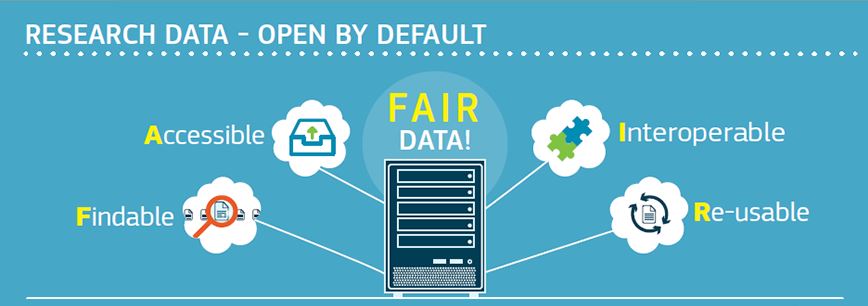Addressing the FAIR data principles when managing research data
26/02/2020

In the context of open science the goal of many research funders is that the research data from funded projects are deposited as open data in a digital repository, e.g. CORD
FAIR is an acronym to help you remember your key goals for managing your research data, and you should build this into your research plan from the start. Your data should be Findable, Accessible, Interoperable and Reusable.
To achieve FAIRness, datasets should be available online in a searchable resource, e.g., a catalogue, data repository or archive, and at least have:
- A persistent identifier (PID). An example of this is a digital object identifier (DOI), which is a permanent url that can always be used to link to the resource and will make the data more findable
- Rich metadata (elements which describe the data). This will enhance findability, interoperability and reusability of your data
- A clear licence. This lets researchers who find a dataset understand what they are allowed to do with it
Findable
- Your data will be published online in a searchable resource e.g. catalogue, data repository or archive.
- Your chosen repository or archive will assign a persistent identifier to your data.
- You will provide rich metadata describing your data, according to the requirements of the repository or archive.
Accessible
Not all data can be made openly available and FAIR does not mean that data need to be open. As a rule of thumb data should be ‘as open as possible, as closed as necessary’.
- If your data can’t be made openly available, access conditions should be made clear to researchers wishing to re-use your data, e.g. only available for research purposes.
- Metadata will be accessible, wherever possible, even if the data aren’t.
Interoperable
Data and metadata should conform to widely used file formats and disciplinary standards for data collection should be used where possible to allow your data to be combined and re-used with other data.
- Your data will be provided in suitable file formats for long term access and re-use.
- The metadata will be provided following relevant disciplinary standards.
- Controlled vocabularies, keywords, thesauri or ontologies will be used where possible.
Reusable
A lot of documentation is needed to support data interpretation and reuse. The data should conform to community norms and be clearly licensed so others know what kinds of reuse are permitted.
- Your data will have a clear and accessible data usage license.
- Your data and metadata will meet relevant disciplinary standards.
Useful resources
- Wilkinson, M. D. et al. The FAIR Guiding Principles for scientific data management and stewardship. Scientific Data 3:160018 doi: 10.1038/sdata.2016.18 (2016).
- FAIRsharing.org is a curated, informative and educational resource on data and metadata standards, inter-related to databases and data policies.
- Ball, A. (2014). ‘How to License Research Data’. DCC How-to Guides. Edinburgh: Digital Curation Centre. Available: http://www.dcc.ac.uk/resources/how-guides
Image from
https://www.openaire.eu/open-research-data-the-new-norm-in-h2020
Categories & Tags:
Leave a comment on this post:
You might also like…
Keren Tuv: My Cranfield experience studying Renewable Energy
Hello, my name is Keren, I am from London, UK, and I am studying Renewable Energy MSc. My journey to discovering Cranfield University began when I first decided to return to academia to pursue ...
3D Metal Manufacturing in space: A look into the future
David Rico Sierra, Research Fellow in Additive Manufacturing, was recently involved in an exciting project to manufacture parts using 3D printers in space. Here he reflects on his time working with Airbus in Toulouse… ...
A Legacy of Courage: From India to Britain, Three Generations Find Their Home
My story begins with my grandfather, who plucked up the courage to travel aboard at the age of 22 and start a new life in the UK. I don’t think he would have thought that ...
Cranfield to JLR: mastering mechatronics for a dream career
My name is Jerin Tom, and in 2023 I graduated from Cranfield with an MSc in Automotive Mechatronics. Originally from India, I've always been fascinated by the world of automobiles. Why Cranfield and the ...
Bringing the vision of advanced air mobility closer to reality
Experts at Cranfield University led by Professor Antonios Tsourdos, Head of the Autonomous and Cyber-Physical Systems Centre, are part of the Air Mobility Ecosystem Consortium (AMEC), which aims to demonstrate the commercial and operational ...
Using grey literature in your research: A short guide
As you research and write your thesis, you might come across, or be looking for, ‘grey literature’. This is quite simply material that is either unpublished, or published but not in a commercial form. Types ...






